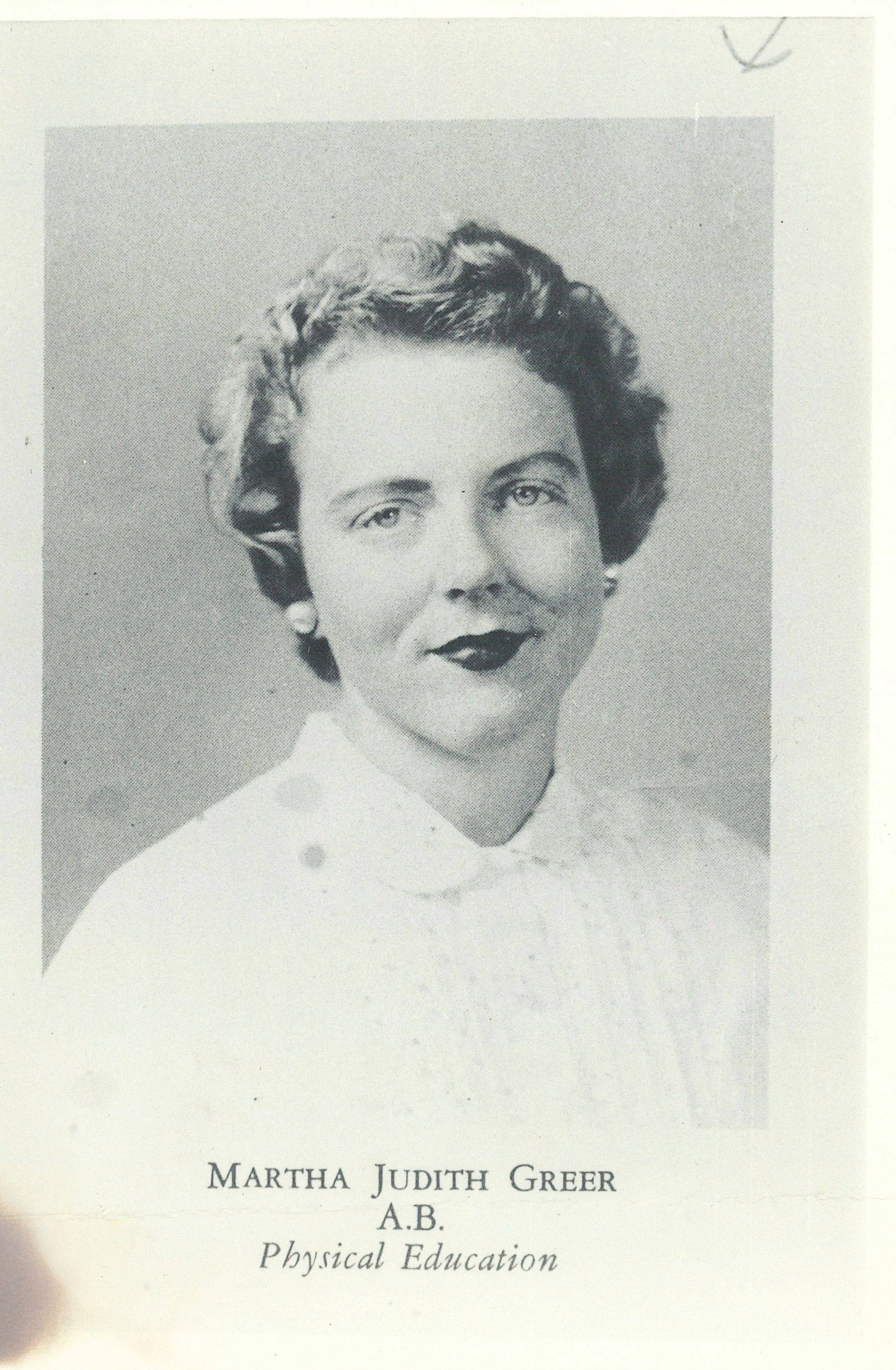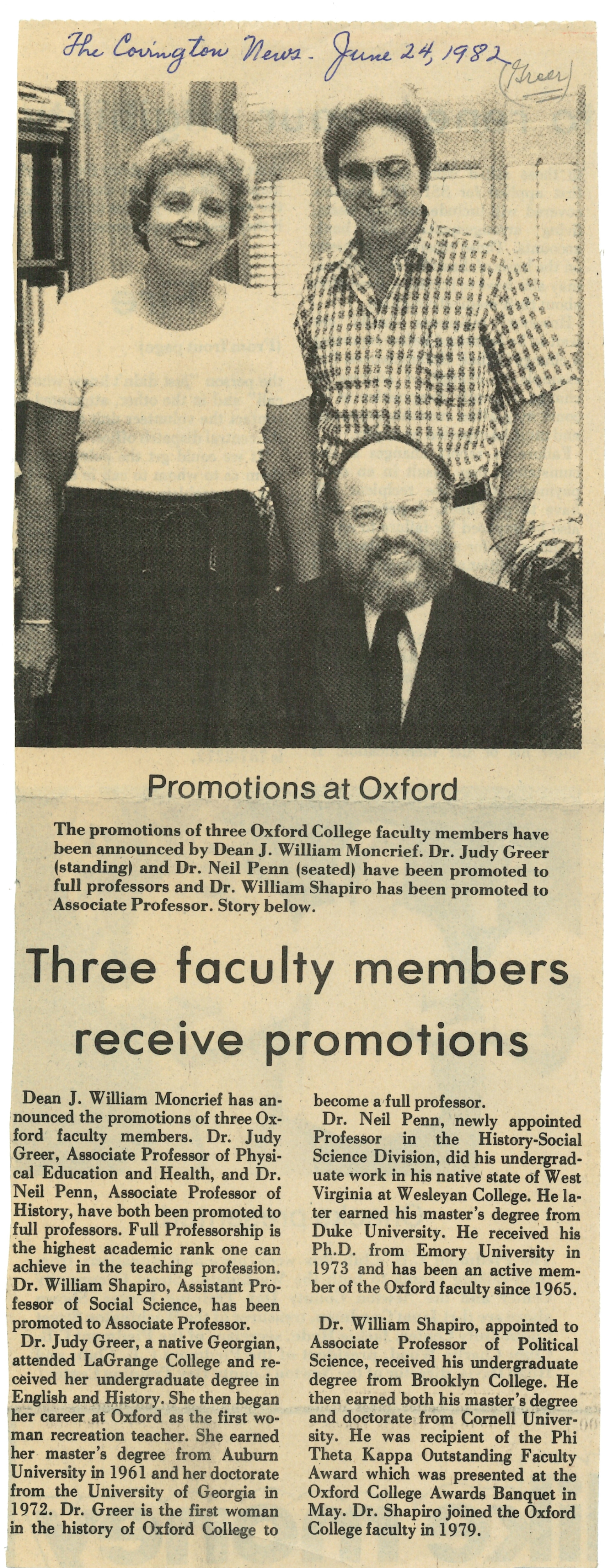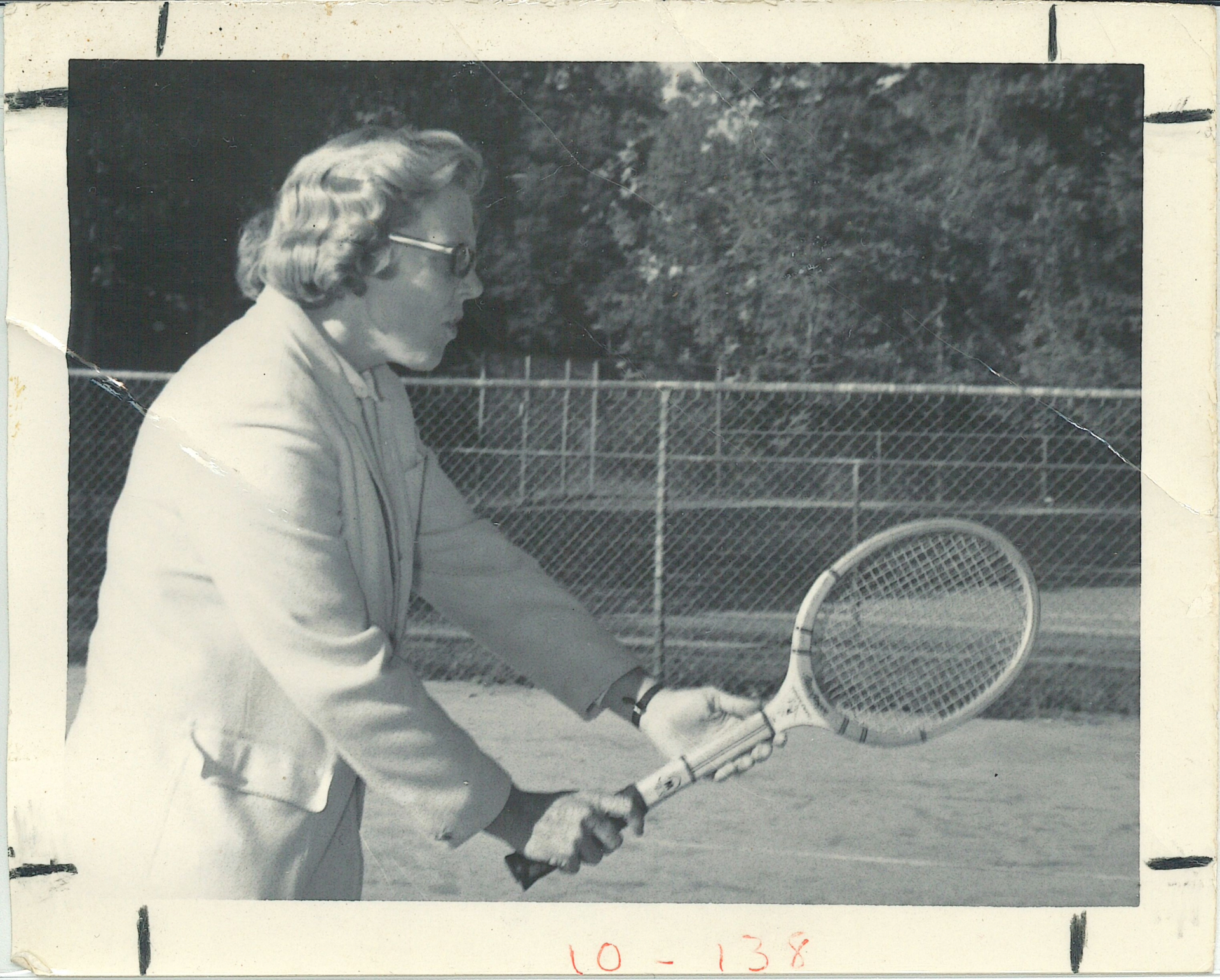The Story of Dr. Judy Greer
Dr. Judy Greer recently celebrated her 90th birthday. She stands as an Oxford legend whose decades of dedication have left a memorable mark on the campus and on everyone she has worked with.
Legends are usually found in books or fading photographs, but here at Oxford College, some stories are still being lived. Just down the street is someone whose presence continues to shape this Oxford. When she’s on campus, she smiles warmly at students on their way to class. She remembers the early days of Oxford College and what it meant to stand for something greater, to face adversity with quiet strength and resilience.
Dr. Judy Greer has been a steady and inspiring force in this community, a pioneering educator, coach, and administrator who gave 33 years of service to Oxford College. She never sought the spotlight, but her work paved the path for other students, faculty, and staff.

As the years went by, she would come back to Oxford and see the family, often striking up conversations and having dinner. It was during her senior year, in the midst of sending out job applications and planning her next steps, that Emily let her know that her parents were coming to LaGrange for a visit and that her father, Dean Eady, would like to speak with her. Judy recalls the conversation as if it were yesterday. She says, “he said, ‘What would you think about coming to Oxford? We have two men in physical education, and we need a woman because we're going to have more women students at Oxford.” She didn’t have the introductory courses to major in the subject. Still, with her background working with the sororities, starting a women's basketball team, and being an athlete herself, she felt as if it would be natural for her.
Dean Eady gave Greer a one-year appointment in the role in 1957, on the condition that she would have to start her master’s degree. She remembers those early days vividly. “I was scared to death,” she says, “I wasn't really an educator yet, and I didn't open my mouth in the faculty meetings for at least two years.” Still, she threw herself into the work. “I taught five or six classes—the whole smear of physical education activity classes,” she recalls. “I lived in the dorm, was an assistant dorm president—dorm mother, whatever you want to call it. I was on faculty committees, ran intramurals...All the faculty were very accepting.”
Despite the pace, she kept pushing forward in her studies, earning her master’s from Winthrop College in 1961 and a year later leaving Oxford to teach at Winthrop College for four years. Dr. Greer would return to Oxford in 1966, right around the time Dean Eady was set to retire. She remembers, “He called me and said, ‘I want you to come back.’” Judy would go on to later obtain her PhD from the University of Georgia in 1972.
She was appointed associate professor in 1973, and in 1982, she became the first woman at Oxford to be promoted to full professor; a historic achievement she carried with quiet pride.

The promotion meant something to her, of course—and to those who knew her. “I was proud of it, for sure, and my family was really proud. But I knew it was coming at some point.”
Beyond the titles and accolades, she understood the significance of her presence. “I felt for the younger faculty, especially the women,” she reflects. “I wanted to be a positive example for them—to show them they were accepted.”
The journey wasn’t without its challenges, particularly as faculty culture began to shift. “There were some real challenges, especially when faculty began to be more thoughtful about what they were working toward,” she notes. But through it all, she remained steady, a quiet force, building community, shaping lives, and walking ahead so others could follow.
Over her 33 years at Oxford, she held a wide range of roles: physical education instructor, women’s counselor, Assistant Dean of Students, and coach of the women’s tennis team. She also led intramural sports and championed student development with tireless dedication and deep compassion.
Though she built a community within Oxford itself, Judy’s influence didn’t stop there. She would attend church. She started the first YMCA and was on the board. She facilitated dance programs, exercise programs, and even adult programs.
And yet, some of the most unexpected and lasting chapters of her journey began not with a plan, but with a racket.
She often said she never even saw a tennis court until college. Growing up in the small town of Casita, Georgia—just below Fort Benning—she graduated from the smallest accredited high school in the state. “I tell everybody I was in the top 10 because there were only nine in my class.” She jokes.
Back then, her world revolved around basketball, softball, and church. Tennis wasn’t even on the radar. But that changed at LaGrange College. It was there, almost by chance, that she picked up a racket and discovered a love for the game. Though the early instruction left much to be desired, her natural movement and competitive spirit carried her. She won matches, more on instinct than technique, but when she began teaching tennis, everything changed.

To teach, she had to understand the game truly. She says, “I had to unlearn a lot because the teachers weren't very good. When I started teaching it, I had to think about my strokes. So, I had a lot of struggles to learn how to teach tennis because before then, I was just out there batting the ball.” This was the beginning of something much deeper than just hitting balls; it was the start of a lifelong relationship with learning, with mentoring, and with sport as a tool for transformation.
When the physical education department restructured its curriculum, she chose tennis as her specialty. That decision led her to coaching, and soon she found herself leading both women’s and men’s intercollegiate tennis teams. She didn't set out to be a coach; in her words, “It just happened.” But for the hundreds of students she guided on and off the court, it was no accident.
At Oxford, where she coached the women’s team to multiple NJCAA regional runner-up finishes, the role of coach became a way to connect with students, some of whom had never touched a racket before, and help them find confidence, joy, and belonging. Even to this day, many years later, former players and students still walk up to her at alumni gatherings, not just to reminisce about specific matches at Young Harris or Tifton, but to say: “Coach, I’m still playing tennis. I learned it right here on these courts.”
For her, that’s always meant more than trophies. Because in the end, she never really saw herself as a coach, not in the traditional sense. “I liked the term, but I did more teaching than I did coaching time-wise, people-wise,” says Dr. Greer.
It was no surprise then that she became the first recipient of Oxford’s Fleming Award for Excellence in teaching. She summed it up in a way only she could,
“The fact that you can open another person’s mind to something they’ve never had any inkling of before, and you see that light come on… or you see the ball go over the net… that’s pretty exciting. And it’s important—just in our culture. I never considered anything else but teaching."
By the time of her retirement, Dr. Greer had already poured decades into Oxford, shaping students, building programs, and quietly changing lives. When the Class of 1959 established the Judy Greer scholarship in her name upon her retirement in 1996, it was more than just a kind gesture. It was a thank-you note written in permanence; a tribute from the people who knew firsthand what her presence had meant.
Judy isn’t the type to bask in recognition. The first scholarship was awarded in 1997, and for her, the real reward was what the scholarship would go on to do.
“It’s got to help them financially, for sure,” she said, always practical first. “And it’s nice to be remembered in that way…”
But she didn’t linger there long. Because in true Judy fashion, she shifted the focus, as she always did, back to the students.
“I’ve personally been enriched by the students who’ve been selected for it,” she said. “And many of us have continued to stay in contact.”
That’s what mattered most to her. Not the name on the scholarship fund. But the people. The ongoing connection. The idea that something she helped build might continue quietly helping someone else, just like she always had.
As the interview wrapped, it became clear that Judy’s journey wasn’t just about her success or accolades. It was about being part of something larger, a legacy built on sacred ground, a place that shaped not only who she became but the very essence of her spirit. When asked how Oxford had shaped her identity, she said, “A lot of times I'll sit around, or when I can't sleep at night, I'll say, what would my life have been? Hadn’t been Oxford…it shaped me, let's put it that way.”
In her words, “This is sacred ground.” And through her story, we come to understand that the true trailblazers don’t just blaze paths; they carry the weight and dignity with every step, protecting the ground beneath to keep it sacred for future generations.
In September, Dr. Judy Greer will be celebrating her 90th Birthday. This milestone also marks the 30th anniversary of the Dr. Judy Greer Scholarship, a lasting tribute to her dedication to generations of Oxford students.